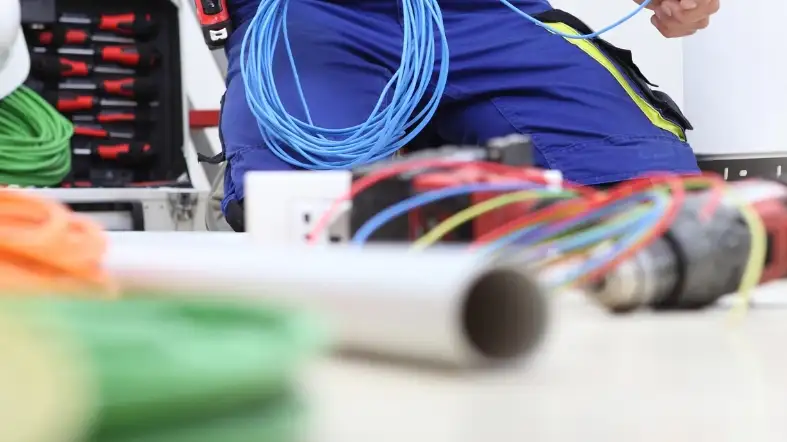Are you planning to install an 80-amp circuit? In this case, knowing what size wire for 80 amps is crucial for the safety and efficiency of your electrical system.
The recommended wire sizes for 80 amps range from 2 AWG to 4 AWG, depending on the material and installation method.

What Size Wire for 80 Amps?
For 80 Amps, the recommended wire gauges range from 2 AWG to 4 AWG for 80-ampere breakers. However, you can use a 4-gauge copper wire or a 3 or 2-gauge aluminum wire for 80-ampere breakers.
80 amps Wire Size Chart:
| Wire Type | Wire Size | Ampacity |
|---|---|---|
| Copper | 4 AWG | 85 Amps |
| Aluminum | 2 AWG | 90 Amps |
| Copper | 3 AWG | 100 Amps |
| Aluminum | 1 AWG | 110 Amps |
| Copper | 2 AWG | 115 Amps |
| Aluminum | 2/0 AWG | 135 Amps |
According to the National Electric Code (NEC), the best wire size for a single-phase 120/240V 80 Amp circuit is 4 AWG copper wire (85 Amps ampacity at 75°C) and 2 AWG aluminum wire (90 Amps ampacity at 75°C).
If the current draw exceeds 80 amps, it’s recommended to use a 1-gauge wire. The next size after 1-gauge is 2/0, followed by 3/0.
4-gauge copper wire can be used for an 80-amp service. Alternatively, you can use a 3 or 2-gauge aluminum wire for the same service.
Different Types of Wires Suitable for 80 Amps
Copper Wires
Copper wires are a popular choice for electrical wiring due to their high conductivity. This means they allow electricity to flow easily, making them efficient for transmitting power.
They are also corrosion-resistant, which means they can withstand harsh conditions without deteriorating.
However, the downside is that copper is more expensive than aluminum, which can be a significant factor when considering large-scale projects or tight budgets.
Aluminum Wires
Aluminum wires are another common type of electrical wire. They are cheaper and lighter than copper, making them a cost-effective and easy-to-handle option.
However, they have a lower conductivity than copper, meaning they may not be as efficient in transmitting power.
Additionally, aluminum can corrode over time, especially when exposed to certain environmental conditions.
Stranded Wires
Stranded wires are composed of many small wires bundled together. Their main advantage is their flexibility.
Unlike solid wires, stranded wires can bend easily without breaking, making them ideal for installations that require wiring to navigate around obstacles.
However, one downside is that they can be more difficult to connect to terminals because the individual strands need to be properly contained to ensure a secure connection.
Solid Wires
Solid wires consist of a single solid piece of metal. They are easy to connect to terminals because there’s only one piece of metal to deal with.
They’re also less likely to corrode compared to stranded wires because there are fewer surfaces exposed to the air.
However, solid wires can break if they’re bent too much or too often, so they’re not as suitable for applications that require a lot of wire movement.
How to Determine the Right Wire Size for 80 Amps

Understanding Wire Gauge
Wire gauge refers to the physical size of the wire. In the American Wire Gauge (AWG) system, the smaller the wire gauge number, the larger the wire diameter.
For instance, common sizes include 16-, 14-, 12-, 10-, 8-, 6-, and 2-gauge wire. The size of the wire dictates how much current can safely pass through the wire.
Importance of Insulation
Insulation is a protective layer that covers the wire, preventing electrical shorts. It’s crucial to choose a wire with insulation that can withstand high temperatures without melting or breaking down, especially for an 80-amp service.
Calculating Wire Length
The length of the wire affects its capacity to carry current. Longer wires have more resistance, which can lead to heat buildup and voltage drop.
Therefore, when determining the right wire size for 80 amps, it’s important to calculate the total length of the wire run.
Temperature Considerations
Temperature can significantly impact a wire’s performance. Higher temperatures increase electrical resistance and decrease the wire’s capacity to carry current.
If your wiring will be in a hot environment, you may need a larger wire size for 80 amps.
For an 80-amp service, a 3 AWG copper wire is suitable if your wiring run won’t reach 100 feet. However, if you’re working with aluminum, a 1 AWG is suitable for 80 amps.
Electrical Resistance
Electrical resistance is a key factor in wire size selection. The wire should have a low resistance to allow electricity to flow easily. The thicker the wire, the lower the resistance.
So, for 80 amps, you need a wire that’s thick enough to carry this current without overheating.
Current Carrying Capacity
The wire must be able to carry 80 amps of current without overheating. This is known as its current carrying capacity. The thicker the wire, the higher its current carrying capacity.
Ambient Temperature
The temperature around the wire can affect its performance. If it’s too hot, the wire might overheat and fail. So, choose a wire that can withstand the ambient temperature.
Installation Method
How you install the wire can affect its performance. For example, wires in conduit can get hotter than wires in open air. So, consider your installation method when choosing your wire size.
Voltage Drop
Voltage drop is a decrease in electrical potential along the path of a power source. Long wires can have a significant voltage drop, which can affect the performance of your electrical devices.
To minimize voltage drop, you might need a thicker wire.
Safety Codes and Standards
Safety codes and standards set rules for electrical wiring to prevent fires and other hazards. Always follow these codes and standards when choosing your wire size.
Environmental Conditions
Environmental conditions like moisture, chemicals, and physical impact can damage wires. Choose a wire that’s durable enough to withstand these conditions.
Cost and Availability
The cost and availability of different wire sizes can vary. While thicker wires are better for carrying current, they’re also more expensive. So, consider your budget when choosing your wire size.
Local Regulations and Zoning Requirements
Local regulations and zoning requirements can affect what type of wiring you can use. Always check these regulations before choosing your wire size.
For an 80 amp service, you need a 4-gauge copper wire size. If you exceed 80 amps, you should jump to 1 gauge45. The next size after 1-gauge is 2/0, followed by 3/045.
Benefits of Choosing the Correct Wire Size for 80 amps

Safety
Choosing the correct wire size for 80 amps ensures safety. A wire that’s too thin could overheat and cause a fire.
But a wire that’s just right will safely carry the current.
Efficiency
The right wire size can improve the efficiency of your electrical system. It reduces energy loss due to resistance, so your devices get the power they need without wasting energy.
Device Performance
Your electrical devices will perform better with the correct wire size. They’ll get the right amount of current, so they can operate at their best.
Longevity
The correct wire size can extend the life of your electrical system. It reduces strain on the wires, so they’ll last longer.
Cost Savings
While larger wires can be more expensive upfront, they can save you money in the long run. They’re more efficient and durable, so you’ll spend less on energy and maintenance.
Compliance with Codes
Using the correct wire size helps you comply with safety codes and standards. This can save you from fines and penalties.
For an 80 amp service, a 3 AWG copper wire or a 1 AWG aluminum wire is typically suitable if your wiring run won’t reach 100 feet.
Always consult with a professional electrician or refer to local codes and standards to ensure safety and compliance.
Risks of Using an Incorrect Wire Size
Overheating and Fire Risk
When a wire is too small for the current it is supposed to carry, the wire will heat up. This overheating can lead to the insulation melting, which might result in a fire.
It’s crucial to match the wire size with the electrical load it’s meant to carry to prevent such risks.
Damage to Electrical Devices
If the wire is too thin, it may not provide enough power to your devices. This can cause them to malfunction or even get damaged.
Energy Waste
A wire that’s not the right size can lead to energy waste. If the wire is too thin, it will have high resistance, which means more energy will be lost as heat.
On the other hand, if the wire is too thick, you’re wasting money on unnecessary copper.
Reduced Performance
The performance of your electrical system can suffer if you use the wrong wire size. For example, a light bulb might not shine as brightly, or a motor might not run as efficiently.
Remember, always consult with a professional when dealing with electrical wiring to avoid these risks.
FAQs About Wire Sizing for 80 Amps
Is copper or aluminum wire better for an 80-amp circuit?
Copper wire is generally considered better due to its higher conductivity and lower resistance, but aluminum is usually cheaper.
Can I use a smaller wire size for a short distance?
No, using a smaller wire size than recommended for an 80-amp circuit can be dangerous and is against electrical codes.
Do I need a single wire or multiple wires for an 80-amp circuit?
You will need at least three wires for an 80-amp circuit: one for the hot, one for the neutral, and one for the ground.
How long can the wire run be for an 80-amp circuit?
The length of the wire run affects voltage drop, so consult the National Electrical Code (NEC) tables or an electrician for specific guidelines.
Does the length of the wire affect its suitability for 80 amps?
Yes, longer wires may require a larger size due to voltage drop.
Conclusion
Choosing the right wire size for an 80-amp circuit is crucial for safety and efficiency. Opt for a 4-gauge copper wire or a 2-gauge aluminum wire to meet electrical codes and minimize voltage drop.
Always consult a qualified electrician to ensure you’re making the best choices for your specific needs.

